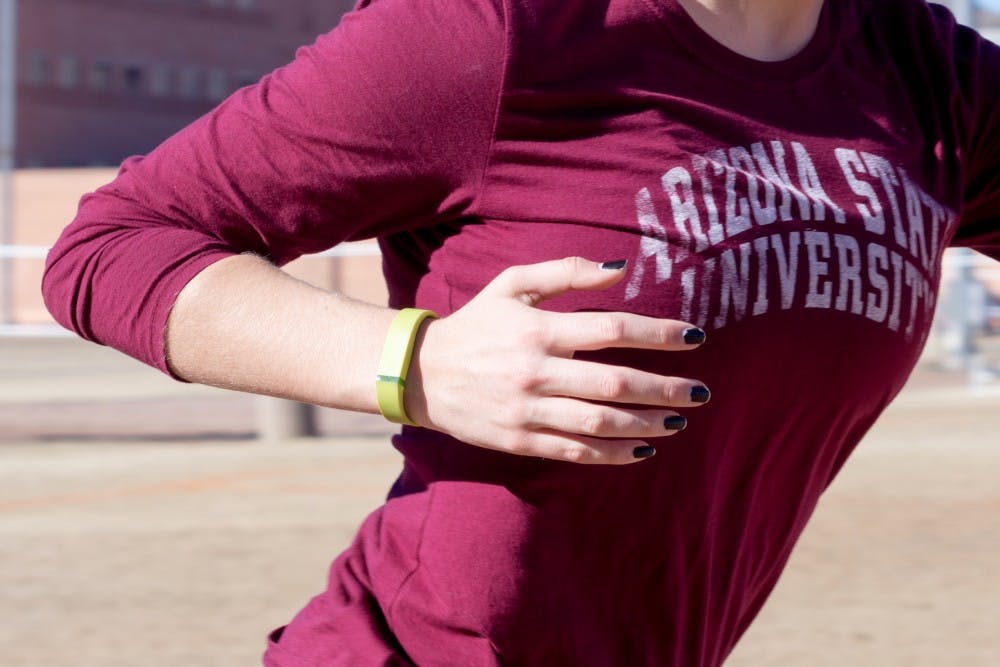On a personal level, I know that the control so many people are empowered by has started to encapsulate my life. As I am typing, I look over to the Fitbit on my left wrist, tap … tap … tap.
11:24 p.m., 11,490 steps, 56 bpm, 4.78 miles, 2,368 calories burned… I don’t dare turn to my phone to recognize how many calories I ate today. I didn’t do enough; I never do enough.
I was health conscious before I was gifted my Fitbit HR for Christmas, and that is exactly why I asked for one. What better way to ensure I am on track to lose the weight than have every single calorie I use, of every single second of the day analyzed, tracked and at my fingertips?
Well — I can think of a few things.
Today, I miss being able to tell myself, “treat yo self” at 1 a.m. when my friends order pizza. I want to join them, but tap … tap … tap — I can’t.
Now, I do not blame Fitbit for this unfortunate side effect of the genius technology. The goal of this product was to help people be healthier, and in no way could I view that negatively.
Maybe it's still that time of year, or the startling obesity statistics that are continuously released, but as a society, we are becoming more health conscious.
And as good members of today’s technological age, it is not surprising that so many of us have enhanced our health ventures with fitness wearables like the Fitbit.
For many, fitness trackers are incredibly helpful. They can monitor your heart rate, sleeping patterns, steps, distance and calories burned. These little devices are taking the guesswork out of the health process, and people love how in control they can be.
The less recognized reality of control is that there is a line between being self-aware and becoming obsessive.
Most of these wearables also sync to phone apps that simplify daily food journaling, allowing users to ultimately see their daily breakdown of calories in versus calories out. Some products, like the Fitbit, even allow for challenges between other device users to provide a little healthy, competitive motivation.
ASU nursing sophomore Meghan Hiryak shares her take on the Fitbit:
Video by Kendra Penningroth | State Press
So in the realm of becoming more health conscious, these wearables are certainly doing the trick for their users.
After all, it helps people do exactly what nutritionists have been begging us to do all along: pay attention. Mindlessly snacking is a lot harder to justify when the calorie count is right their at your fingertips. You can no longer justify that Big Mac with your single-mile run because the calories you have actually used are right there on your wrist.
However, like all good things — “too much,” is very possible.
What began as an innocent and relatively fun means of gathering a perspective of exactly what my body was doing has become an obsession. Everyday I meticulously log my food and exercise, hoping to end on a calorie deficit. Every night before bed I am tapping on my Fitbit praying I have not eaten a single calorie more than I have used. If I have, I am in my pajamas doing burpees, jumping jacks or lunges right there in my dorm room at whatever unsightly hour it happens to be.
It can’t just be me either. I cannot be the only Fitbit user who has turned health consciousness into a health obsession. It could be my obsessive-compulsive disorder, general anxiety or Type A personality to blame, but I truly have lost control.
Emma Lord, a lifestyle writer, wrote a very intriguing article" 19 Very Real And Emotional Struggles Of Having A Fitbit (Or Does Your Fitbit Have You?)” confirming my concern.
As a person who has struggled with their weight and body image their entire life, I want to warn you: Do not allow yourself to obsess over your Fitbit, it can get out of control.
And fast.
Related Links:
ASU student combines wearable technology, video games to fight childhood obesity
The Apple Watch: a giant waste of money
Reach the columnist at Kendra.Penningroth@asu.edu or follow @KPenningroth on Twitter.
Like The State Press on Facebook and follow @statepress on Twitter.
Editor’s note: The opinions presented in this column are the author’s and do not imply any endorsement from The State Press or its editors.
Want to join the conversation? Send an email to opiniondesk.statepress@gmail.com. Keep letters under 300 words and be sure to include your university affiliation. Anonymity will not be granted.




